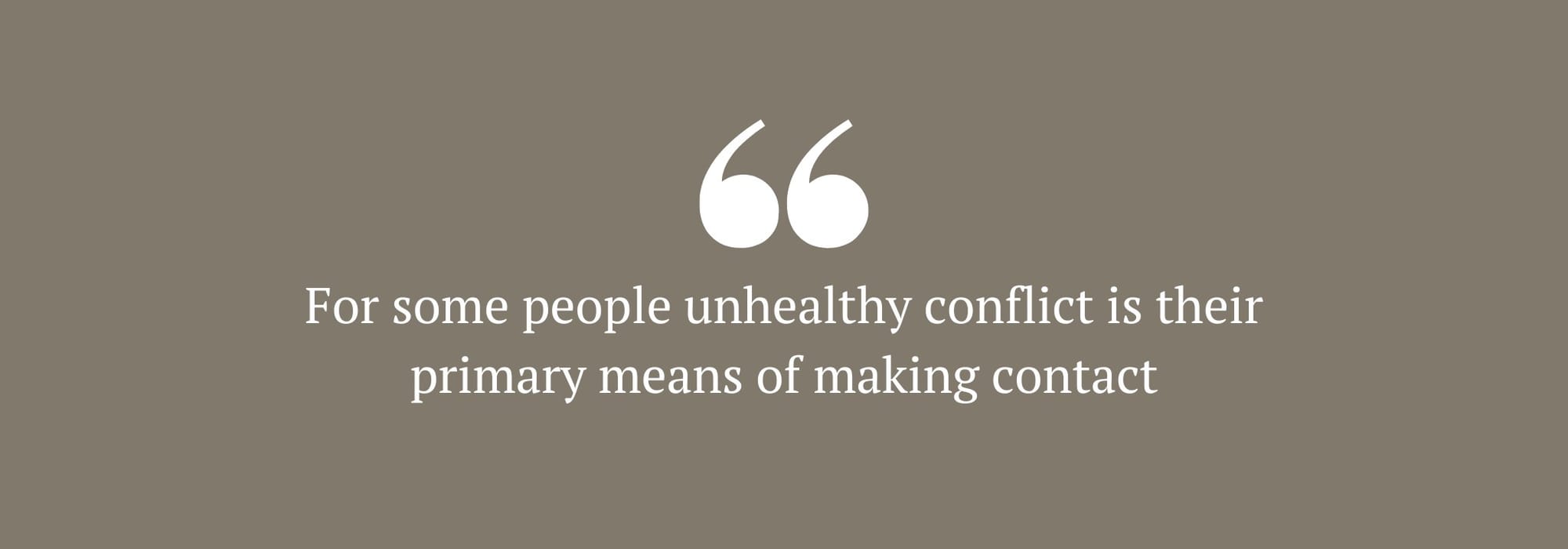Following conflict, do you find yourself ruminating on what could have gone differently? Perhaps it’s time to explore your relationship with confrontation
You had a row with a friend of yours where things got pretty heated, and strong emotions were present. You arrive home and close the door behind you when, after replaying the scenario for the 10th time in your mind, you finally think of the perfect comeback.
It’s such a common experience that the French even have an expression for it: ‘l’esprit d’escalier’, meaning ‘the spirit of the stairs’. This emerged after French encyclopedist and philosopher Denis Diderot described a confrontation that left him speechless, until he came to himself again when he reached the bottom of the stairs, and suddenly found the words he was looking for. In Russian, the saying ‘zadnim umom krepki’, translating to ‘our hindsight is strong’, captures a similar feeling. And, in English, ‘afterwit’ describes wisdom that comes to us after it is of any use.
But beyond moments of relatable comedy, sometimes, it can feel really hard to let go of conflict, as we find ourselves drawn to reliving the scenario over and over again in our minds – imagining all the ways it could have gone differently. We might also term this feeling as ‘conflict regret’, covering the experience of holding on to, and replaying, conflict after it has happened, and feeling unable to let it go.
A degree of rumination is to be expected. After all, even healthy conflict isn’t exactly pleasant. However, studies have found links between rumination and negative mental health effects, including in research published in Behaviour Research and Therapy, which found that rumination can exacerbate negative feelings by magnifying and prolonging negative mood states, interfering with problem-solving, and maintaining physiological stress responses.
There’s nothing immediately wrong with dwelling on the perfect comeback following an altercation – but, what does a healthy relationship with conflict look like, and how can we learn how to let go? David Woolfson is a counsellor and anger specialist. For David, the behaviours associated with conflict regret are something that he sees regularly and, he says, it all begins with the relationships we have with conflict in the first place.

“Conflict has a bad reputation,” he says. “But what is usually being talked about is ‘unhealthy conflict’. Unhealthy conflict is then often followed by conflict regret, synonymous with toxic shame. This can be a lifelong pattern. Conversely, healthy conflict is an essential part of our progress and personal growth, and can be learned.”
David shares how, in his therapeutic work, clients frequently display unhealthy patterns around conflict and shame, which leads them to dive into questions such as: ‘What do I put in the way of intimacy?’ And: ‘How can I learn to give and receive love?’
“Recognising the roots of shame is vital for healthy interaction,” David explains. “This involves facing uncomfortable truths about ourselves to present authentically to others. Toxic shame, the belief that one is inherently flawed (‘I am a mistake’) rather than having made an error (‘I have made a mistake’), is driven by ingrained beliefs, and stories that are generally neither true nor kind. These usually stem from our past, childhood experiences, and traumatic imprints, which we embody and carry unconsciously. Such unacknowledged narratives hinder our growth into adulthood, and affect our ability to form intimate, healthy relationships.”
The way that this sense of shame links to conflict regret is in how it can manifest in other behaviours, such as, David suggests, perfectionism at any cost, striving for control, rage, arrogance, rationalising, criticism, blame, judgement, contempt, patronising, care-taking, rescuing, envy, and people-pleasing. “These behaviours, while seemingly protective, obstruct intimacy and connection, leading to unhealthy conflict, followed by regret,” David explains.
Following a confrontation, when the adrenaline fades from your body, you may suddenly be able to see things more clearly – coming to that moment where you think of ways you could have done things differently. It’s at this point when you may suddenly stumble across the perfect comeback, but it can also come with some more challenging feelings, too.
“You contemplate the consequences of your behaviour,” David says. “You see the effect on spouses, children, and colleagues. Like a leaking balloon, you slowly fade and collapse telling yourself ‘I’m such an idiot, I’ve done it again, how can I be such a…’ And, typically, ‘I should have known better.’”

In the heat of the moment, the ‘right’ words may escape us, but there are things that we can plan to do in order to achieve a healthier and more helpful approach to conflict. If things are getting heated, there’s nothing wrong with asking to take a moment to yourself, to gather your thoughts. You may also want to consider the patterns you tend to repeat each time you’re in a scenario like this, and then see if you can break it down to address some of the underlying issues that may come up, perhaps with the help of a wellbeing professional.
“Importantly, for some people unhealthy conflict is their primary means of making contact,” David explains. “Acting out can be their only way of defining who they are, usually ‘against’ another. For some people, this is often carried into adulthood. These entrenched behavioural patterns create physical paths in the brain, which are difficult to modify later in life.
“Conflict regret perpetuates a cycle of unhealthy behaviour and unkind attitudes toward oneself, others, and the world. By externalising our shame, we can separate from it, and separate from our harsh inner critic, allowing us to reality-test the beliefs associated with it. Honesty and openness in sharing our experiences with others can help us overcome the limitations of these outdated narratives.”
On a practical level, you can also take steps to break down the drive to be the ‘winner’ in a confrontation, ensuring you address the core of the issue and work towards a resolution. You can consider using language that is less accusatory, and centre the conversation on your feelings, rather than the shortcomings of the other person – for example: ‘I felt hurt when you were late, as it makes me feel like our friendship isn’t a priority to you.’ Rather than: ‘You don’t care about our friendship because you’re always late.’ When you learn to let go of the idea of coming out on top, you’ll likely find that the time you spend ruminating on the issue decreases.
“Conflict regret and shame are impediments to personal growth and improved interpersonal skills,” says David. “Embracing all parts of ourselves, especially the aspects we find challenging, is crucial. It is OK to make mistakes, they are an essential part of our learning and development process – to be imperfect is to be human.”
So, next time you find yourself agonising over the perfect comeback that could have won you the argument, take a moment to reflect on your relationship with conflict, and the ways it weaves its way into your behaviour. You may find that the ideal comeback could be more like: “Let’s talk this one out.”


Comments